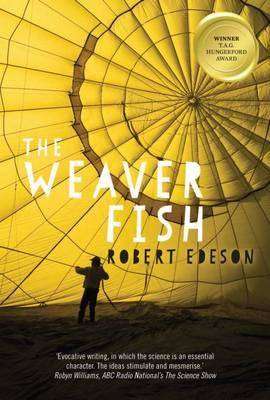THE WEAVER FISH author Robert Edeson – Interview
Today we welcome Robert Edeson, Aussie author of The Weaver Fish to Booklover Book Reviews.

Cambridge linguist Edvard Tossentern, presumed dead, reappears after a balloon crash. When he staggers in from a remote swamp, gravely ill and swollen beyond recognition, his colleagues at the research station are overjoyed. But Edvard’s discovery about a rare giant bird throws them all into the path of an international crime ring.
The Weaver Fish is a gripping adventure story. Set on the island nation of Ferendes in the South China Sea, this book’s sound science and mathematical playfulness will make you question all that you know, or think you know, about weaver fish, giant condors, the infamous tornado-proof Reckles Texan hat, and much much more.
(Fremantle Press, 2014)
What inspired you to write The Weaver Fish?
Mischief, really. The idea of testing the limits of reader credulity.
Would you say this novel is plot or character driven?
Neither. It is more a novel of themes. Characters voice the ideas (in dialogue or correspondence, for example), and plot steers the characters along the protagonist Tøssentern’s quest to find weaver fish.
Tell us a little bit about your main character.
There are two main characters, Edvard Tøssentern and Richard Worse, as well as two strong women. Tøssentern is an academic linguist and the more psychologically complex. Worse is the action figure, intelligent, capable, discerningly ruthless, and moral. It is he who takes charge of the thriller developments that lead back to Tøssentern and the weaver fish.
What type of reader do you think would most enjoy The Weaver Fish?
The Weaver Fish is for the roundly educated, attentive reader. It is an exploration of language, authenticity, deception and, ultimately, conscience. Readers who are scientifically and a little mathematically literate will discover the most; psychiatrists, linguists, logicians, others secretly drawn to erotica and academics generally should enjoy it, except historians and clerics, who might be outraged. I recommend those who are crossword puzzlers to read the index, which has several cryptic entries.
How does this title compare to others you have written?
My other publications have been nonfiction, appearing in scientific journals. The Weaver Fish, being almost entirely bogus, was more fun to write, and something of a flight from seriousness in my previous career.
 Can you tell us a bit about your writing process (e.g. researched involved)?
Can you tell us a bit about your writing process (e.g. researched involved)?
Wherever authoritative research, historical background, supporting evidence, academic citations, scholarly endnotes, bibliographic detail, apposite quotations, firearms expertise, aviation science, French fraught philosophy, scriptural passages, lascivious poetry, papal scandal and so on were required, I made them up. This saved a lot of effort and obviated tiresome copyright and defamation concerns.
Do you have any tips or advice for aspiring fiction writers?
For this I defer to my mentor, the profoundly more accomplished A B C Darian, who offers the following:
Write to satisfy the person most interested: yourself.
Writing comes first to the imagination, then to the page. Therefore, in an emergency, rescue your mental life before your stationery.
The artistry of fiction is not realist, but anamorphic. Therefore, live observantly in the world, in order sometimes to copy it, but more importantly not to copy it.
Many things are not the world.
A dictionary is a book of ideas.
But a thesaurus is a resource of wrong words, and too many of them.
The prerogative, and obligation, of fiction is to deceive.
To write a novel, you must swallow its poison.
Write exactly the necessary and sufficient.
The Weaver Fish is available from:
Booktopia | Bookworld | Book Depository | Kobobooks | Amazon
Robert Edeson was born in Perth, Western Australia, and educated at Christ Church Grammar School, the University of Western Australia and the University of Cambridge. He has been a consultant anaesthetist and researcher, publishing in the neuroscience, biophysical and mathematical literatures.
